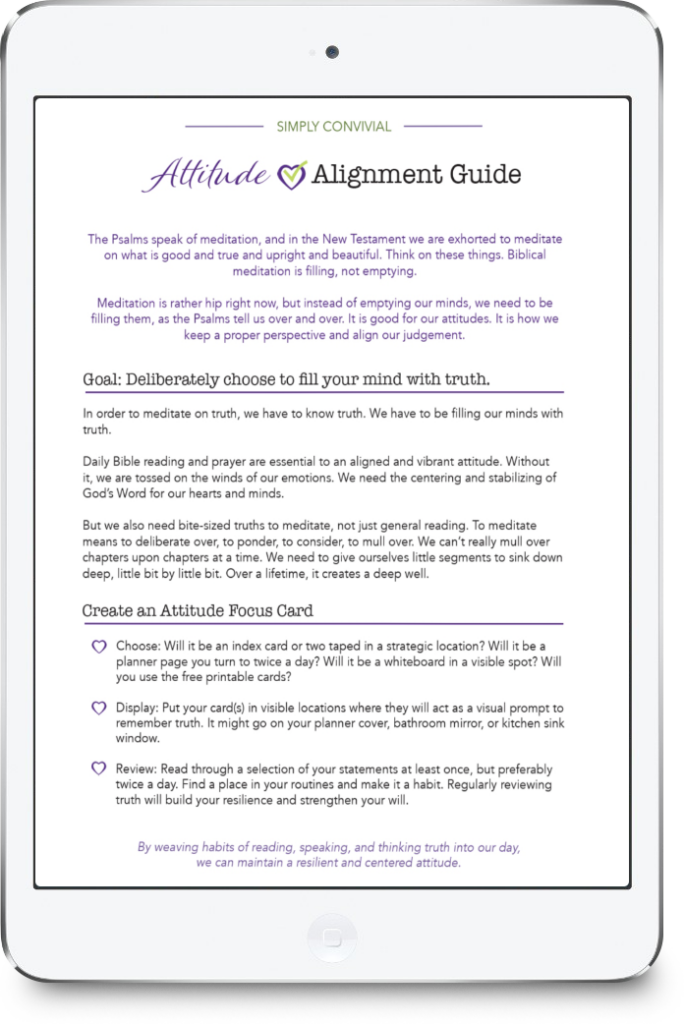As moms, we recognize our need to be more flexible, but we rarely consider what we really mean. What do we want when we want more flexibility?
Usually, when we want flexibility, we’re actually noticing negatives without really being sure what the solution is. Flexibility is a nebulous, vague concept, but it appears to be the answer to our rigidity, to our irritation and frustration when things don’t go our way, to our inability to adapt and cope with the real life situations we face.
Flexibility is the solution to our tendency to get bent out of shape and break when life changes unexpectedly. Life is full of change, both anticipated and unexpected. Flexibility is the ability to adapt and cope with change of all kinds.
Flexibility means we know we’re not in control
The key mindset shift that we need in order to grow in flexibility is that we are actually not in control, meant to ensure our plans come to fruition. God’s plans are the only ones sure to come to pass. Giving up the idea that control is ours to exert is the first step to becoming more flexible.
We’re only meant to have self-control, not situation-control or others-control. The important way we exercise self-control when things don’t go our way is to reject the temptations to frustration, anxiety, and perfectionism. Instead, we choose gratitude and faithfulness.
Just like an athlete becomes more flexible by stretching, so a life that stretches us makes us more flexible if we don’t resist the change, but grow the strength of our core and let our limbs flex.
Inside Simply Convivial Continuing Education, we’ve been discussing and applying flexibility. The women in our community have shared some great insights that they are also willing to share here with you:
“I’ve been studying the book of James in church Bible study. So many parts of it can be connected with these issues of flexibility and sanctification. In ch. 5, ‘establish your hearts’ (or strengthen, or stand firm, depending on translation) is having the foundation right, the spine we talked about this week. That’s what gives you the ability to endure/have patience/be steadfast in the trials (throughout James.).
“I like the ESV word ‘steadfast’ in thinking about this. So with an established heart and steadfastness, you can say, ‘If the Lord wills, we will live and do this or that…’ (ch. 4) instead of ‘Today or tomorrow we will go to this city and carry on business…’ when we ‘do not even know what will happen tomorrow!’
“In summary, we can make our plans while submitting them to God’s will, standing firm in Him and allowing the trials and unexpected things to produce perseverance and maturity in us (ch. 1, 4 & 5).”
-Anna Laura Farnam
Simply Convivial Community Member
“I work in disaster response. I’ve been thinking about flexibility in light of that – we must be flexible as every response is an unknown, details are always different, what is available or required is always different and often not known until we’re there, etc.
So we must be flexible; but also not ‘fly by the seat of our pants.’“Things like safety, regulatory compliance, financial responsibility… those kinds of things must not be lost even in the midst of much unknown. So it comes down to having clarity about our big picture goals and values – and working with whatever the current situation is to best meet our goals while not compromising our values.
“Seems like that is equally true in homemaking / life – though maybe not as obvious. (Disaster tends to force clarity in ways that are often ‘hidden’ in the normal day to day. I often find insight in thinking of ‘day to day”‘questions in light of disaster response.)
“Appropriate flexibility means being clear on what my goals and values are – then working with whatever the current situation is. Sometimes living my values and achieving goals means following the plan… but sometimes it means adjusting when the situation changes. I need to re-aim to make sure I’m still working within my goals and values and not rigidly ‘sticking to the plan’ when that plan no longer honors what the situation truly calls for, or when the plan no longer actually achieves what is most important in the given situation.”
-Laura Hibberd
Simply Convivial Community Member
Flexibility is not getting bent out of shape
How do we flex in the times we face?
When we are flexible, it means we have a strong core, a strong center, that holds in high winds. We bend and adapt and flex, responding properly to the actual situation in front of us. The stronger and more strongly rooted our base and core is, the better able we are to roll with the punches and respond faithfully, even when the situation unfolds differently than we wanted or expected.
Deep roots and a strong core comes from certainty in God’s goodness and sovereignty. God is unchanging, so we can rest in Him when times and situations change more rapidly than we anticipated. Prayer, Scripture, assurance, keep us grounded and rooted when life is unexpected.
“Flexibility and sanctification….I immediately think of Mary, the Mother of Our Lord. I’m pretty positive when the angel appeared to Her, it was most certainly not on her weekly dashboard ????.
That moment required serious flexibility, yet it was literally sanctification incarnate when she gave her fiat: her ‘yes’ to God’s plan for her life. The two are most certainly intertwined.”
-Cathy LeBlanc
Simply Convivial Mentor Member
Flexibility is not spineless
Flexibility is being not rigid, but it’s also not being a puddle on the floor. Flexibility takes backbone.
Sometimes we think that we care too much and too deeply, so we’re not able to be flexible when we don’t get the results we wanted. Therefore, we try not caring. Not caring is not the key to flexibility at all. Flexibility isn’t people-pleasing. It’s staying stable with a strong anchor, but floating atop the waves that roll.
“I am mulling over Mystie’s encouragement to look for the path of gratitude. Still haven’t found any possibility of a reason God might have me in my current situation.
I was reading about Belshazzar and the writing on the wall. Matthew Henry’s commentary mentions how God humbled Nebuchadnezzar and then Belshazzar should have taken notice of that and humbled himself: ‘And it is a great aggravation of the unhumbleness of our hearts when we know enough to humble them but do not consider and improve it, particularly when we know how others have been broken that would not bend, how others have fallen that would not stoop, and yet we continue stiff and inflexible.’“It made me think about what Mystie had said about accepting the road in front of you as God’s will for your sanctification. Even if I can’t see what to be thankful for about the fact that surgery recovery, the start of a hernia, and a screaming baby means I am mostly stuck in a chair instead of pulling my house and kids back together and doing what feels like ‘living life,’ I can humble my heart and not stiffen my neck and acknowledge God’s authority to direct my path. If this is it, I will meekly walk in it.”
-Naomi Marks
Simply Convivial Community Member
There is always a path of faithfulness.
We have to hold our imagined desired outcomes loosely and know for sure there is always, no matter what, a path forward in faithfulness and gratitude. There is always a way to glorify God, no matter what happens in life.
“I’ve found that flexibility is nearly always about giving grace to others, so the golden rule applies. I try to remember that, whatever the annoyance, someone besides me is being affected.
Most of us are stressed out. Bearing in mind that ‘a gentle word turneth away wrath, but a harsh word stirs up anger’ is very helpful. Speaking kindly to others (and being cheerful) does not always get us what we need or want, but it can help ease the anxiety associated with changing plans and expectations.
“Most of all, it pleases the Lord to see us keeping a cheerful attitude during trying times. That means, in the grand scheme, it matters a lot!”
-Kimberly Ewald
Simply Convivial Community Member










